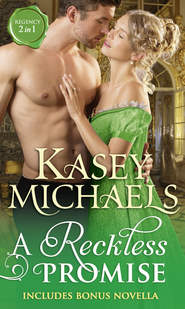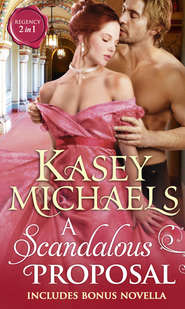По всем вопросам обращайтесь на: info@litportal.ru
(©) 2003-2025.
✖
A Reckless Beauty
Автор
Год написания книги
2018
Настройки чтения
Размер шрифта
Высота строк
Поля
“Jack asked you to do that?” Rian could barely see through the bright red of his sudden fury.
Brede smiled. “No. But he holds an affection for you, and I have an affection for him. I also have enough consequence to get you reassigned to Wellington’s own staff. He needs good men, with Pakenham and so many others cut to pieces in New Orleans, damn that stupid war for the folly it was.”
Rian nodded his agreement. “My brother Spencer fought at Moraviantown. He called that battle considerably less than laudable.”
Brede brushed aside the comment. He had places to go before nightfall. “The Duke doesn’t hide, so if you’re with him, you’re not out of danger. But there’s more than one way to fight a war, Becket. With your body, thrown into the field against other bodies, or with your brains.” He extracted the cheroot from his mouth, stared at the glowing tip now that the sun was sliding toward the horizon and it was growing darker beneath the trees. “I offer this only the once, Rian Becket, and for the sake of an old friend who did me more than one good turn on the Peninsula. As you so rightly said—I’m no nursemaid.”
“Thank you, my lord,” Rian said, bowing to the man. “I would, of course, be honored.”
“Only a damn fool wouldn’t be,” Brede said, smiling once more. “Two days from now, as I have things to do, things that don’t concern you. I’ll see you on Monday, exactly here, sometime before noon, with new orders for you in my possession. You will be ready to go, or I’m leaving without you. Understood?”
Rian opened his mouth to answer, but the Earl of Brede had already turned to walk away, taking no more than ten steps back out onto the wheat field before gracefully throwing himself up onto the saddle of a sleek, dappled gray stallion whose head had been held by no less than Captain Moray.
Brede turned the horse, pulled back on the reins so that it reared up on its back legs as the Earl threw Rian a casual salute, and then he was gone, gray figure and gray horse soon fading into the equally gray twilight.
“Uxbridge isn’t the only flamboyant one,” Rian mumbled as he headed toward a grinning Captain Moray. “He merely dresses better….”
CHAPTER FIVE
THIS WASN’T TOO TERRIBLE. The countryside was beautiful, the air not too uncomfortably warm, and the horses a grand protection. Fanny might miss her soft bed and Bumble’s fine way with a chicken, but the adventure made up for that.
And, with every mile, she drew closer to Rian.
“Who will probably attempt to box my ears for me,” Fanny muttered quietly behind the scarf she’d tied around her nose and mouth to keep out the dust raised by the horses.
She rode at the back of the troop, which meant that after the dried strip of beef she’d had for breakfast, she was having road dust for luncheon. Mentally, she added the lovely tin tub in her bedchamber at Becket Hall to the list of things she missed most.
“Private Reilly!”
Fanny rolled her eyes and straightened her slim shoulders. Honestly, the man was constantly at her; her own father didn’t guard her half so closely. Of course, if he had, she wouldn’t be riding across Belgium at the moment, would she? “Yes, Sergeant-Major!”
“We’ll be at the cantonment in another few minutes. Just around the next bend, I’m told. Now, here’s what I’m doing. You’ll see that brother you’ve come all this way to see, and then you’ll be off to Brussels with the rest of the women who had nothin’ better to do than follow along with us. No women here for much longer, Private Reilly, to help with the cookin’, the washin’. Uxbridge won’t allow it. You’ll have plenty to do, helpin’ with the wounded when the time comes, honest women’s work, and then you’ll be shipped off home, wherever that is.”
“But, Sergeant-Major—”
The Sergeant-Major shook his head, sighing in an exaggerated way. “And here she goes again, dear God, thinkin’ she has somethin’ to say to any of this. Show me an army of women, and I’ll show you pure disaster, every one of them questionin’ me, thinkin’ she knows best. ‘Oh, no, Sergeant-Major Hart, we should camp farther from the stream, it’s too damp here. We’ll catch a sniffle.’”
Fanny pulled down the scarf and grinned at the man. “When you get to heaven, Sergeant-Major, the good Queen Boadicea may have a word or two to say to you.”
For the first time since she’d encountered the Sergeant-Major, Fanny saw the man smile. “Her? She was only in a snit.”
“She raised an army against the Romans, destroyed London and was responsible for killing seventy thousand soldiers. That’s a bit more than a snit, don’t you think? And then we might discuss the Maid of Orleans, the famous Joan—”
“And they don’t know when to stifle themselves, women don’t,” the Sergeant-Major grumbled, pulling on his muttonchops. You’ll be goin’ on to Brussels, where it’s safe, you hear me?”
Fanny was fairly certain she shouldn’t ask him to say please, and simply nodded her agreement. “I was stupid, sir. I shouldn’t have come.”
The Sergeant-Major slapped his huge thigh. “Well, now, that’s what m’sister shoulda said, back in aught-six. But she chased her Bobby Finnegan all the way to the Peninsula. He didn’t thank her for it, any more than this brother of yours will be thankin’ you. Dead these eight years, the both of them.”
Fanny’s stomach clenched. “On the Peninsula?”
He nodded. “Caught a fever, like so many. Private Reilly, I’ve seen men starve. I’ve seen men drown in holes they dug to protect themselves from the enemy. I’ve seen…You do what I say. I’m not to be havin’ you on my heart along with my Maureen. I’ve no one now, no home, no family. So I take good care of you boys…you all.”
Fanny pulled up the scarf once more. “I’m sorry, Sergeant-Major, that I’ve worried you, even as I realize how fortunate I am that you’re the fine man you are. When this is over, I know my papa will want to shake your hand, want to thank you. Will you please remember this? Becket Hall, in Romney Marsh. If I could find my way here, you can find your way there. You’ll always have a welcome and a home there if you wish it, that’s a promise. Papa has a great respect for honest, brave men.”
Sergeant-Major Hart looked at her rather incredulously, but then nodded. “Becket Hall, in Romney Marsh. I’ll remember. Now, you stay with these horses, tend to them, and I’ll find your Lieutenant Becket for you. Mayhap keep him from saying what he should say. And no tears from you, Private Reilly. You hear me?”
“Yes, sir!”
He shook his head in mock dismay. “Such a simple thing, lass. Sergeant-Major.”
Fanny grinned behind her scarf as he rode back toward the head of the line. “Such an honorable man—sir.”
And then, because she knew she’d been wrong to follow him, because she knew Rian was going to tell her how wrong she’d been to follow him—and at some length—Fanny blinked away her tears and prepared to do battle with the man too stupid to know she loved him. Had always loved him.
RIAN WATCHED the Sergeant-Major walk away and then turned to look at his sister as she sat cross-legged on the ground in front of him. Her face was smudged brown with road dirt from the middle of her cheeks to the top of her butchered blond hair, the whites of her eyes and their emerald-green centers thrown into stark relief above the bottom half of her face, which seemed unnaturally pale.
And she was in uniform. Even the Sergeant-Major, who had been pleading her case for her—if calling her a brainless baby was pleading for her—had been aghast to hear her at last admit how she’d come by that uniform.
Rian stayed seated on a large flat boulder, his elbows over his knees, staring at her, and said nothing.
He was quiet for a long time. He looked so sad to Fanny, so angry. So disappointed in her. She longed to run her hands through his black as night hair, put the blue sky back into his stormy eyes. If, as he’d said, she was pretty, he was beautiful. Like some tragic Irish poet, his brothers had always teased him. Almost too pretty to be real. He’d wondered why she’d worried for him, followed after him?
Her heart broke for him. She swore she could feel it break.
“Rian?” Fanny said at last, as the grass was wet, and her rump was getting cold. That was the difference between them—he felt his own torment, while she, more pragmatic, mostly felt the damp. “I said I was wrong. I said I’d be willing to go to Brussels.”
Rian swore sharply and leapt to his feet. “Well, Fanny, isn’t that above all things marvelous? You’ll go to Brussels. You’ll do us all this great favor—after making a bloody mess and having the family out of their minds, worrying about you. Hell, they’ll probably all be here by morning, looking for you. Why, we’ll have us a party, won’t we? Jesus!”
“Oh, don’t be so dramatic. They won’t do that. Will they? Come here? Not Papa, surely. He never goes anywhere.”
Rian beat his fists against his chest, reminding Fanny of her mother rhythmically beating her fist against her chest just before the sky fell in on them all. “This is my time, Fanny! My turn, damn you. I’m not some infant who needs caring for, and I damn well don’t want to be caring about you. Not now. This is war, Fanny—not some bloody adventure.”
“You always said it was an adventure,” Fanny said, then quickly bit her lip. She should keep her mouth shut, Sergeant-Major Hart had warned her. Take all he throws at you and don’t argue with him. “I…I’m sorry. Go on.”
“Go on?” Rian looked around the small clearing, the same clearing he had stood in only days earlier with the Earl of Brede as that man offered him a place on Wellington’s staff. Well, Fanny had put paid to that, hadn’t she? “Damn you, Fanny! We’re not children anymore. We’re not on the island. We’re not even at Becket Hall, chasing across the Marsh together. And hear this, Fanny—you’re my sister. You’re my bloody sister!”
“No, I’m not,” Fanny whispered. “I was never your sister, and you were never my brother. You were my friend. And…and I love you.”
Rian turned his back on her, his chest stabbed by a very real, physical pain. “Sweet Jesus,” he said, looking up at the trees, seeing the sun almost straight above his head through the leaves. He’d seen this coming, for years, Fanny’s infatuation with him. He wasn’t an idiot. Or maybe he was, but was this the time for that most important conversation? No, damn it all, it wasn’t. Not with Brede showing up at any moment.
He turned back to her, held out his hand to pull her to her feet. “There’s no time for this now, Fanny. The Sergeant-Major said he’d make arrangements for you to ride to Brussels with the other women tomorrow or the next day—three at the most. Did you bring a gown with you in that pack you’re carrying? You’re not staying in uniform. I won’t allow it.”
Predictably, Fanny’s despair flashed into anger. They’d often fought, growing up together. Fought together, as well as laughed together, cried together. “You won’t allow it? And who are you, Rian Becket? You said you’re my brother, you’re not Papa. You can’t tell me what to do. I won’t allow it!”
Rian felt his own anger drain out of him, to make more room for the fear—fear for Fanny that she didn’t seem to understand. “You do have a gown. You wouldn’t be so angry, if you didn’t have a gown rolled up in here,” he said, grabbing the pack before she could move toward it. He unbuttoned it and dumped the contents onto the grass. “And there it is. I don’t suppose you thought to bring a brush—and some soap.” He picked up the gown, tossed it at her. “Go back into the trees and put this on.”
“No.”











